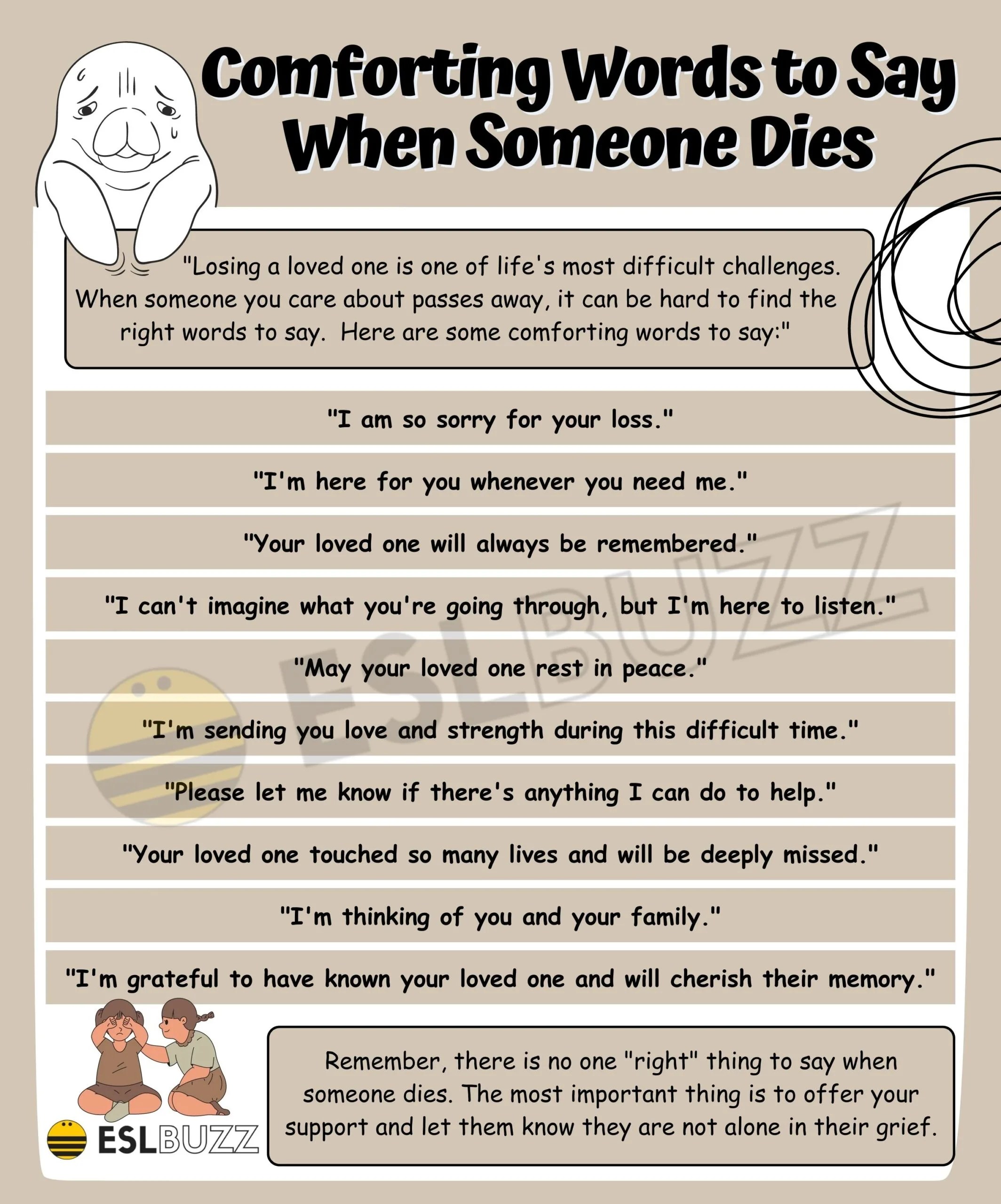Finding The Right Words To Say When Someone Dies
When faced with the loss of a loved one, finding the right words to say when someone dies can feel overwhelming and daunting. The emotional weight of death can make even the most eloquent among us struggle to express our feelings. It’s in these moments of grief that words become incredibly powerful—they can provide comfort, show support, and express condolences. However, the challenge lies in knowing what to say and how to convey your empathy genuinely.
In a world where communication often feels superficial, the depth of our words can profoundly impact someone who is mourning. Whether you're attending a funeral, sending a card, or simply offering support, the right phrases can create a safe space for the bereaved to process their emotions. This article aims to assist you in navigating these sensitive situations, offering suggestions and guidance on what to say when someone experiences the profound loss of a loved one.
As we explore this delicate topic, it’s essential to remember that everyone grieves differently. What may resonate with one person might not with another. Therefore, it’s crucial to tailor your words to the individual’s situation and relationship with the deceased. The goal is to communicate compassion and understanding, fostering a sense of community during a time of sorrow.
What Should You Consider Before Speaking?
Before you attempt to comfort someone who is grieving, it’s essential to consider a few key factors:
- The relationship with the deceased: Were you close to the person who died? Understanding the dynamics can help you choose your words wisely.
- The emotional state of the bereaved: Be mindful of how the grieving person feels and what they might need in that moment.
- The context of the situation: Consider whether you are speaking in person, sending a card, or communicating through a digital medium.
What Are Some Appropriate Words to Say When Someone Dies?
Choosing the right phrases can make a world of difference. Here are some comforting and thoughtful expressions you can use:
- "I am so sorry for your loss."
- "Please know that I am here for you."
- "I cannot imagine the pain you must be feeling."
- "Their memory will live on in our hearts."
How Can You Show Support Beyond Words?
While words are vital, actions often speak louder. Here are some ways to show support:
- Offer practical help: Cooking meals, running errands, or assisting with funeral arrangements can be incredibly supportive.
- Be present: Sometimes, just being there to listen is the best gift you can offer.
- Check-in regularly: Grief doesn’t end after the funeral; continue to reach out and show your support.
What Should You Avoid Saying?
When someone is grieving, it’s equally important to know what not to say. Avoid phrases that may inadvertently minimize their pain, such as:
- "They are in a better place."
- "At least they lived a long life."
- "I know how you feel."
Can You Share Personal Memories of the Deceased?
Sharing a personal memory can be a beautiful way to honor the deceased. It not only celebrates their life but also helps the bereaved feel connected to their loved one. Here are some ways to share memories:
- At the funeral or memorial service, share a brief story that highlights the unique qualities of the deceased.
- In a card or letter, write down a cherished memory that you have with the deceased.
- Offer to create a tribute, such as a photo album or a video montage, that celebrates their life.
What About Cultural Considerations?
Grief is experienced differently across cultures, and it’s essential to be aware of these differences when choosing your words:
- Research the customs and traditions of the bereaved’s culture to show respect and understanding.
- Be open to learning about their grieving process and adapt your words accordingly.
How Can You Follow Up After the Initial Shock?
After the immediate aftermath of the loss, it’s essential to continue your support. Here are some thoughtful ways to follow up:
- Send a handwritten note or card expressing your ongoing condolences.
- Invite the bereaved for coffee or a walk to provide a space for them to talk.
- Remember important dates, such as the deceased's birthday or anniversary, and reach out to show you care.
What Resources Are Available for Grieving Individuals?
For those who are grieving, various resources can offer additional support:
- Grief counseling: Professional counselors can provide guidance tailored to individual needs.
- Support groups: Connecting with others who are experiencing similar losses can be helpful.
- Books and literature: There are numerous resources available that address the grieving process thoughtfully.
Conclusion: Choosing Your Words Wisely
Finding the right words to say when someone dies may feel like an insurmountable task, but it is an opportunity to offer love and support during a profoundly difficult time. By considering the relationship with the deceased, being mindful of the emotional state of the bereaved, and choosing compassionate phrases, you can become a source of comfort. Remember, actions often speak volumes, and showing your support through deeds can be just as meaningful as the words you choose. Grief is a journey, and your thoughtful presence can provide light in the darkest moments.
Tiwa Savage: The Queen Of Afrobeats
Unveiling The Mystery: Why Did Megan Boone Leave The Blacklist?
Unveiling Stableronaldo: The Rise Of A Remarkable Talent


